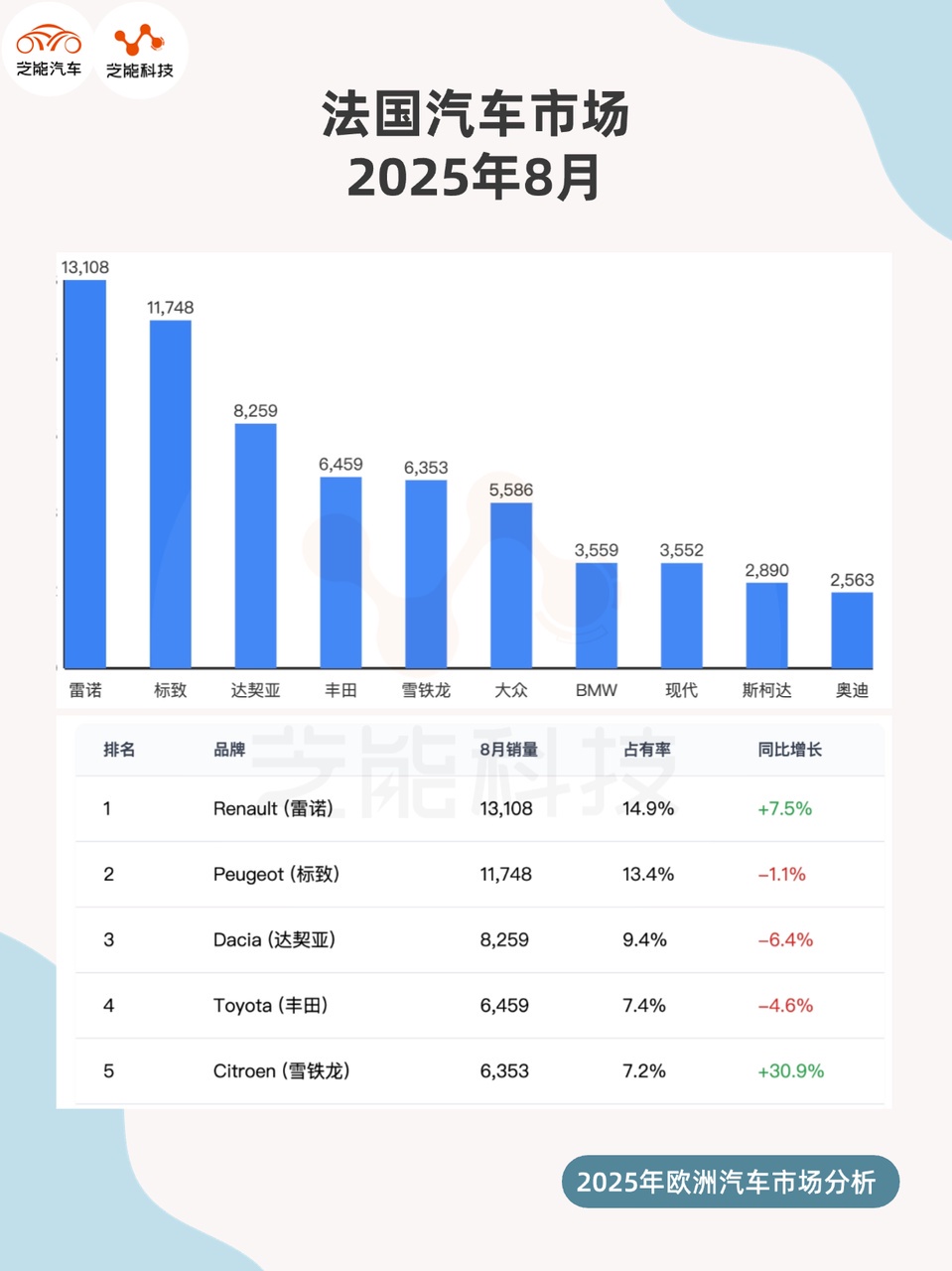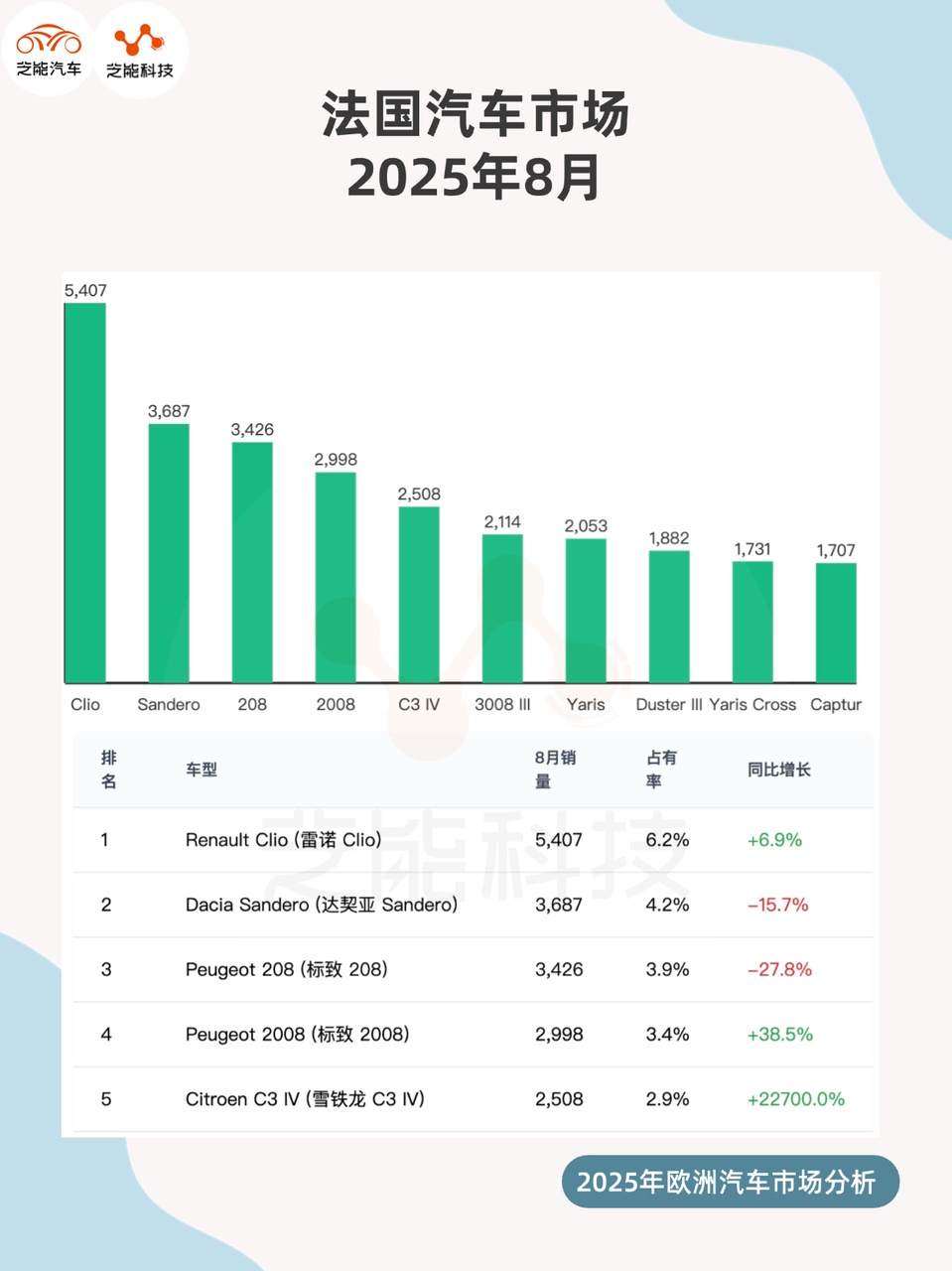
European Auto Market | France August 2025: MG and BYD Break 1,000 Units


Produced by Zhineng Technology
In August 2025, the French new car market finally saw its first growth of the year, but the overall base remains low. The market structure is accelerating its shift towards electrification and hybridization, while traditional fuel vehicles continue to decline significantly.
Local French brands still dominate, but in the new energy sector, Chinese brands, especially BYD, are making their presence felt.

01
Overall Performance and Competitive Landscape of the French Market
In August 2025, new car registrations in France reached 87,850 units, a year-on-year increase of 2.2%, marking the first rebound in the market. However, sales in the same period last year were at a ten-year low, so the growth rate has limited reference value. Cumulative sales for the first eight months of the year still fell by 7.1% year-on-year, to 1,046,432 units.
From the perspective of powertrain structure, the decline of fuel vehicles is becoming increasingly evident.
◎ Gasoline car sales fell by 32.4%, with market share shrinking to just 20.9%;
◎ Diesel car sales dropped even more sharply, down 26.9% year-on-year, with market share falling below 5%.
In stark contrast, hybrid and pure electric vehicles continue to rise.
◎ Hybrid vehicles accounted for 45.2% of the market, with plug-in hybrids declining by 5% but still holding a 6.7% share.
◎ Meanwhile, pure electric vehicles rebounded strongly driven by subsidy policies, with August sales reaching 16,992 units, up 29.3% year-on-year, and market share rising to 19.3%, the highest since September last year.
This shift highlights how French consumers, weighing energy prices, policy direction, and vehicle costs, are gradually transitioning to new energy vehicles.

In terms of brand performance, local manufacturers still lead.
◎ Renault topped the list with 13,108 units and a 14.9% share,
◎ followed by Peugeot, which fell 1.1% in August.
◎ Dacia, though third, saw a 6.4% year-on-year decline, showing signs of weakness.
◎ Citroën benefited from last year's low base, surging 30.9% this month to re-enter the top five.
◎ International brands such as Toyota, Volkswagen, BMW, and Skoda showed mixed performance, with Hyundai growing 31% and market share rising to 4%, the highest level in nearly three years.
◎ Notably, MG rose 56%, while Nissan, Mini, and Cupra all grew by over 60%, demonstrating the flexibility of second-tier joint ventures and emerging brands.
In terms of models
◎ Renault Cliotook the top spot with 5,407 units and a 6.2% share, regaining dominance.
◎ Dacia Sandero andPeugeot 208saw declines, falling 15.7% and 27.8%, respectively.
◎ Peugeot 2008bucked the trend with 38.5% growth, showcasing the resilience of the SUV segment.
◎ Citroën C3 and Peugeot 3008 also ranked high.
◎ Among new energy models, the Renault 5 became France's best-selling pure electric vehicle with 1,412 units, demonstrating consumer trust in local EVs.
◎ Meanwhile, the BYD Seal U entered the top 40 with 645 units sold, a strategically significant debut indicating that Chinese brands are gradually making inroads into the competitive French market.
After two years of downturn, the French auto market is finding growth points driven by the new energy transition. Local brands still dominate, but the international competitive landscape is loosening, leaving room for new entrants.
02
Performance of Chinese Brands in the French Market
In this wave of transformation, the growth of Chinese brands is particularly noticeable.
◎ BYD's August sales reached approximately 1,050 units, a staggering 600% year-on-year increase, with market share rising to 1.2%, far above the 0.2% in the same period last year. Its flagship model, the Seal U, sold 645 units in a single month, soaring 1,854.5% year-on-year, marking the first time a Chinese brand has entered the top 40 in France.
Given the adjustments to France's new energy vehicle subsidy policies and the increasing consumer acceptance of EVs, BYD's performance indicates that its strategy of balancing technology and price is gradually gaining recognition.

◎ MG continues to expand with its cost-performance advantage, selling 1,622 units in August, up 56% year-on-year, and has stabilized in the top 15.
This achievement not only reflects MG's established presence in Europe but also highlights the diversified success of Chinese brands in the French market.
Not all Chinese automakers can break through quickly. Emerging brands like Leapmotor and JAC have yet to achieve significant sales in France, closely tied to the conservative nature of the French market and consumers' reliance on after-sales service networks.
From a competitive perspective, Chinese brands' advantage lies in the maturity of the entire EV supply chain.
France's EV market share is nearing 20%, but local manufacturers mainly rely on the Renault 5 and some hybrid models, lacking a large-scale product lineup. BYD's strength lies in its full-range EV platform and in-house battery production, enabling it to offer competitively priced models in the popular mid-size SUV segment.
Summary
The French auto market is undergoing a structural shift. The accelerated decline of traditional fuel vehicles is leaving ample space for new energy vehicles. Local manufacturers remain strong, but the breakthroughs by Chinese brands are particularly striking. BYD's entry into the top 40 with the Seal U signals that Chinese automakers are no longer just low-end or marginal players but possess the strength to compete head-on.
The copyright of this article belongs to the original author/organization.
The views expressed herein are solely those of the author and do not reflect the stance of the platform. The content is intended for investment reference purposes only and shall not be considered as investment advice. Please contact us if you have any questions or suggestions regarding the content services provided by the platform.

